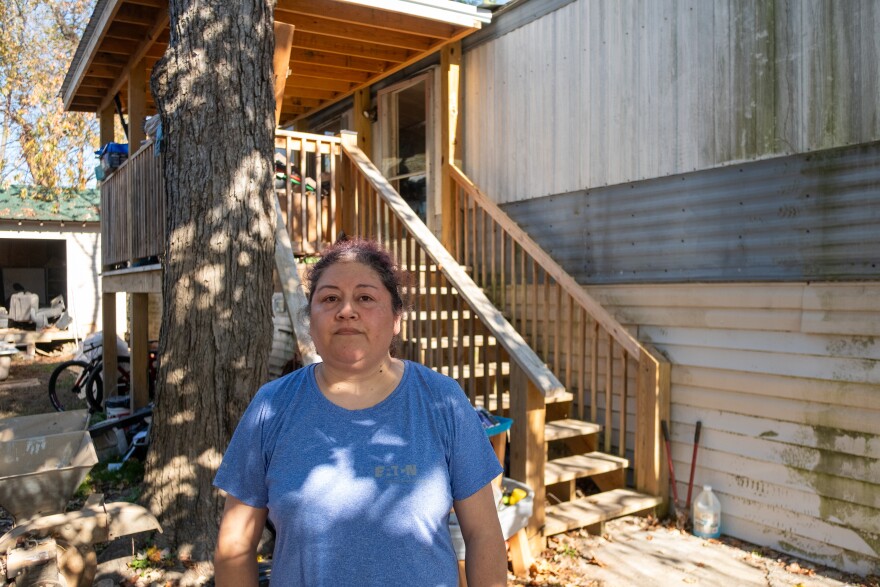Brevard's City Council will try a rarely-used procedure to help a neighborhood of about two dozen families who live in trailers near the French Broad River make their homes habitable again before elevating the residences to comply with federal flood regulations.
Most of the trailers in the Duck’s Drive mobile home park were damaged by floods caused by Hurricane Helene. The neighborhood sits on a dead-end gravel road off Old Hendersonville Highway, just north of downtown Brevard.
At a City Council meeting last month, Spanish-speaking residents pleaded for leaders to green-light repairs on their homes, which requires permitting from the county and city approval. Translator Yesica Rosales interpreted for the residents. Rosales works for El Centro Comunitario Hispano-Americano, a hub for resources and information for Transylvania County’s Latino population.
“I understand that in order to do things in this world you have to follow protocol,” Emiliano Paz told the council. “But when this hurricane hit it affected everyone…when the waters and the wind rushed in, it didn't look for a permit.”
Paz and his brothers live in a trailer on Duck’s Drive with their mother Nadia. The family has been there for almost two decades. Nadia told BPR the area sees a few days of minor flooding every year, but it has never been this bad.
Typically, obtaining a permit after a storm would not be a difficult challenge, but these permits were in jeopardy because of a regulation in the FEMA National Flood Insurance Program, of which Brevard is a participant.
The rule requires “all houses in the flood hazard area elevate to two feet above base flood elevation if substantial improvements are done to the structure.” Substantial improvement is any improvement that costs 50% or more than the value of the structure.
The municipality, leaders say, is bound to NFIP's 50% rule — even if individual homeowners don't carry flood insurance through the program. Rule violations could jeopardize the city's NFIP eligibility — and future disaster assistance funding for properties that weren't in compliance.

The program aims to mitigate the risks involved in repairing or renovating homes that face high chances of being damaged in a subsequent flood. That's in part because FEMA's disaster assistance program would be potentially liable for paying higher rebuild costs for a property that didn't undertake risk mitigation — such as structure elevation — in a well-established flood zone.
But in this circumstance, people in the neighborhood are making repairs so that they can live in their homes again.
Residents wanted to do basic renovations to make the homes habitable, such as removing and replacing flooring and drywall soaked by the floodwater.
“This is where the conflict emerges,” a report by Brevard city staff stated. “There is a public health case to be made for allowing quick repairs so that people can live in safe, sanitary, and stable housing. Yet the elevation requirement is also, despite its difficulty, a public health and safety measure because it protects lives and property from the hazards of flooding.”
Emiliano Paz’s family already raised their trailer about six feet before the storm, and Nadia wonders how much higher the family can sustainably raise it.
City Council members ultimately voted to approve a “temporary repair authorization” to allow residents of the trailer park to start to repair their homes before they raised them. They would have to show that work had started on raising the units in a year, according to city leaders.
“When you look at this realistically, it is a way to really lower that risk because within three years we will comply with the regulations in terms of raising the houses, and it also meets the need for the safety and health of individuals, which, you know, one of the primary roles of government is to ensure that your city is a safe place for people to live,” Mayor Maureen Copeloff said.
A similar program was implemented in Craven County after flooding from Hurricane Florence in 2018.
While construction permits come from Transylvania County and not the city, Brevard acts as the Floodplain Administrator which authorizes property owners to pursue a permit with the county.
Residents who apply can make minimal repairs necessary to render their home safe and sanitary to live, including electrical, mechanical, plumbing and structural work, according to city documents.
People who make these repairs then have one year to “use their best efforts” to raise their unit and bring it into compliance with the city’s floodplain regulations.
The temporary authorization can be extended twice for one year at a time if the property owner shows “a good faith attempt to bring the property into compliance,” such as hiring a contractor or engineer who has an estimate of the cost of work. A property owner seeking an extension must also take one other “concrete step toward designing or acquiring funds to pursue compliance.”






